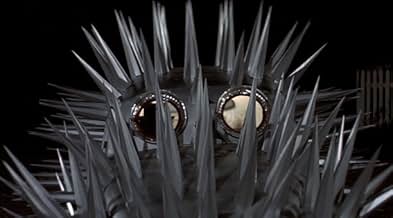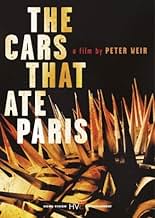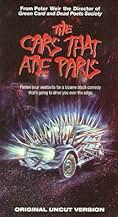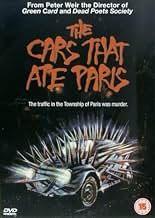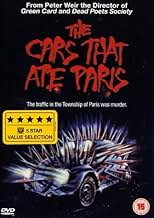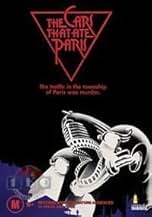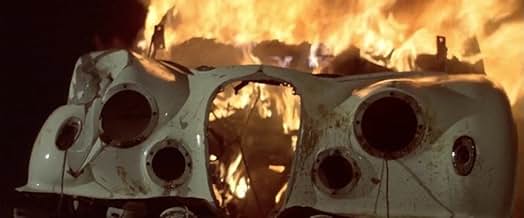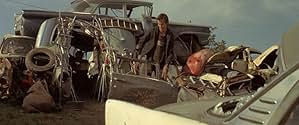Ajouter une intrigue dans votre langueThe small town of Paris, Australia deliberately causes car accidents, then sells/salvages all valuables from the wrecks as a means of economy.The small town of Paris, Australia deliberately causes car accidents, then sells/salvages all valuables from the wrecks as a means of economy.The small town of Paris, Australia deliberately causes car accidents, then sells/salvages all valuables from the wrecks as a means of economy.
- Réalisation
- Scénario
- Casting principal
- Récompenses
- 1 victoire et 1 nomination au total
- Man in House
- (as Herbie Nelson)
- Clive Smedley
- (non crédité)
Avis à la une
Don't watch it if you think low budget is the same as being 'amateurish' because it's not. And if you're not used to Australian English, well, try not to panic. Doesn't matter if you don't get every word - just go with it!
This is the kind of film you don't see much any more, perhaps a product of its era. They weren't thinking much about marketing or target demographics - these filmmakers were just having a lot of fun, experimenting and coming up with something unique. Genre crossing, challenging and freaky, it also taps into some big themes about Australian identity and paranoia.
I should identify that this is not a movie for those with short attention spans. It's not likely to stick heavily in your memory the way that most of Peter Weir's movies do (it's certainly not my favorite of his movies). But still, it's something to check out as a historical reference if nothing else.
"I can drive!" You'll probably feel like you can too.
At one point the score turns Morricone circa Once Upon a Time in the West and we get a showdown in the street and young men dressed with cowboy hats. We get Carmageddon-style cars circling the statue of a cannon like Comanches painted for war. We get the vague promise of a subplot about car crash survivors turned vegetables who are kept in the hospital of the small town and who later turn up in a ball masque dressed in hoods and carton boxes (a nod to Shock Corridor?), but it never goes anywhere. Peter Weir went on to make such remarkable films as Picnic at Hanging Rock and The Last Wave, and while this never reaches the hypnotic levels of those films, it's intriguing in its own quirky awkward way. It's like a movie struggling with itself, a cult classic trying to break free from the confines of a forgettable eccentricity.
There also seems to be a lot of misunderstanding about the nature of the film. Basically, The Cars That Ate Paris is a quirky art-house drama. Yes, it has elements of (macabre) humor, horror and many other genres, but those are not a focus. The Cars That Ate Paris is as much a western as it is a horror film, which is not to say that it doesn't have elements of the western genre--it does. But the tone is much more similar to, say, Bagdad Café (aka Out of Rosenheim, 1987) or Delicatessen (1991) (hmmm--notice the culinary metaphor motif). If you want to think of The Cars That Ate Paris as a horror film--and it is basically a surrealist nightmare--think of it as something like Maximum Overdrive (1986)/Trucks ((1997) meets Horror Hotel (aka City of the Dead, 1960), but made by David Lynch as a "realist" soap opera.
So what is the film about more literally? Well, it's best perhaps if you know as little about it before as possible, but on the other hand, it's a bit cryptic, and Peter Weir isn't exactly forthcoming with explanatory exposition--the film remains very open to interpretation to the end--so maybe a vague description won't hurt. The Paris of the title is not in France. It's instead a small, bucolic village in rural Australia. The town has quite a few "dirty secrets". The two primary secrets have to do with an automobile (part) obsession and a program of human experimentation. For the most part, they try to keep people out of the town, which has a very small population, but their twisted fetishes necessitate the occasional admission of outsiders, though in an unusual, involuntary manner. The film is centered on the story of one particular outsider, Arthur Waldo (Terry Camilleri), who manages to enter Paris relatively unscathed and who for unspecified reasons is worked into the fabric of the town. Arthur's arrival and integration roughly corresponds to a growing cleavage between generations, or at least between the status quo and a rebellious group of younger men, and he unwittingly serves as a catalyst to what amounts to a civil war.
Although in Peter Weir's video interview included on the DVD he refers to Arthur as an unsympathetic protagonist, I beg to differ. Camilleri plays Arthur as an enigmatically captivating simpleton--the most entrancing "blank" personality this side of Peter Sellers' Chauncey Gardiner in Being There (1979). For most of the film, Weir shuttles Arthur around like a pawn, enabling a metaphorical window through which to satirically examine small town (Australian) life. In this respect, The Cars That Ate Paris somewhat resembles the basic gist of Lars von Trier's Dogville (2003), except that unlike Dogville, The Cars That Ate Paris is a good film.
It's particularly funny how Arthur is shuttled into a variety of jobs, which he is assumed qualified for by a mere change of clothing (and very minor changes at that) and title. He's a doctor one moment, a parking enforcer the next. Weir works in satirical jabs towards everything from appealing to noble grand narratives about pioneer forefathers to the discrepancy between religious, private and political life, the myth of the well-adjusted nuclear family, the charade of public ceremonies, and even partakes in a slight Lord of the Flies-styled commentary on "progress".
But not everything is social critique. Weir is just as concerned with (and just as good at) imbibing in quirkiness for its own sake (although even that stuff we could read as a critique on social conventions if we wanted to) and see-sawing between a kind of community existentialist nightmare and an Our Town-like small village drama. And just in case that's too balanced, every so often he puts us in the middle of a spaghetti western, with the beginnings of mid-street showdowns. Much of the rebellious youth material can be interpreted as a western with hodge-podge automobiles, which is probably why those youths are the ones to don clothing that looks as if Weir borrowed it from the set of A Fistful of Dollars (aka Per un pugno di dollari, 1964).
The music is similarly disparate, ranging from techno-psychedelia that's something like Pink Floyd's "Time" to pensive contemporary-sounding themes, or the hilariously amateurish performance at the Paris Ball.
This is definitely not a film for all tastes. If you wouldn't typically like art-house films, you probably won't appreciate The Cars That Ate Paris, either, and even if you do typically like art-house films, you probably won't appreciate The Cars That Ate Paris unless you have a strong taste for the bizarre and macabre.
This is a "cult" movie. When someone tells you something is a cult movie it usually means one of two things: 1- it's a small, indie movie that people have come to discover and it's has grown gradually in success such as Reservoir Dogs (that outgrew it's cult status). Or 2- it's a movie of any size that the vast majority of people hate and a small group of fans adore. Unfortunately this is the latter. Some people will sing this things praises till the end of time but I'm afraid I don't get it. The plot seems to be going somewhere - you start off knowing very little about who's involved in the crashes and why they do it etc, along the way we get clues about experiments on humans and outsiders who live like Mad Max style scavengers, but it leaves us with no answers. The relationship between the mayor and Arthur is strange and isn't followed and I still don't see why the crashes were staged - other than to let some of the residents build a scrap yard.
The performances are sufficiently creepy to help build an air of expectation. Terry Camilleri is epically good and the wishy-washy Arthur. However they are all betrayed by a story that has nowhere to build to and nothing to say. The director also builds the tension well but with nowhere to go what could he do, it's good he's had much better material since.
Overall the film was a severe disappointment - and I wasn't expecting much from it! It's full of promise but the story dies three-quarters of the way in. The spiky beetle is very menacing and looks great but it's not enough to build a film around one cool image. OK - but don't expect any answers.
Le saviez-vous
- AnecdotesThe opening scenes that feature a couple driving in a car and smoking prominently displaying cigarettes were a parody of a commercial aired on Australian television at the time of the film's original release. Website 'Peterweircave' says of this: "The opening "advertisement", which many viewers seem to take as blatant product placement for Coke and Alpine cigarettes, was actually a spoof in itself. At the time it was made, movies in Australia were often preceded by ads for cigarettes and such. By putting this before the opening credits, Weir was fooling the viewers into thinking this was yet another ad."
- GaffesThe people thrown from the car in the first accident are obvious dummies.
- Citations
The Mayor: Have you country boys forgotten the old school war cry? Have you forgotten the meaning of those words? Womerah, Womerah, babaluke, boomerang, crocodile, kookaburra, wombat, orang-outang. Wheeho, whayho, terramungamine, quondong, billabong, gundabluey pine. Platypus, emu, wallaby, 'roo, ibis, brolga, and white cockatoo. Murrumburrah, Cowra, Coolamon, Banco, Boggabri, Narromine, Nevertire, Yanco! Whoo-ra! Whoo-ra! Ha! Ha! Ha! Yanco High School, Yah! Yah! Yah!
- Versions alternativesUS version, titled _The Cars that Ate People (1974)_ was shortened to 74 minutes by the distributor, and star Terry Camilleri's voice is dubbed. The film was finally reissued in the USA at complete length in 1984.
- ConnexionsEdited into Terror Nullius (2018)
- Bandes originalesRock of Ages
(uncredited)
Lyrics by Augustus Montague Toplady
Music by Thomas Hastings
Played at the church
Meilleurs choix
- How long is The Cars That Ate Paris?Alimenté par Alexa
Détails
- Date de sortie
- Pays d’origine
- Langue
- Aussi connu sous le nom de
- Killing Cars
- Lieux de tournage
- Sociétés de production
- Voir plus de crédits d'entreprise sur IMDbPro
Box-office
- Budget
- 250 000 $AU (estimé)
- Montant brut mondial
- 786 $US
- Durée1 heure 28 minutes
- Mixage
- Rapport de forme
- 2.39 : 1
Contribuer à cette page


![Regarder Trailer [OV]](https://m.media-amazon.com/images/M/MV5BYmRjNDU0MDItYTEwZS00NmM5LTkyNTEtMTg2MGU1ZGRiODQ4XkEyXkFqcGdeQXRyYW5zY29kZS13b3JrZmxvdw@@._V1_QL75_UX500_CR0)
